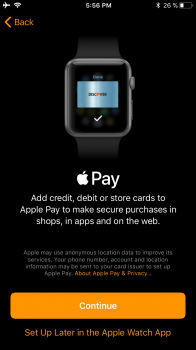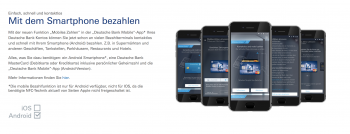I hope nobody thought, there are technical issues, old infrastructure or something related, that prevents Apple Pay from starting. It will be just a question of contracts and the split of the low fees for electronic payment.
Not true.
See, for Apple several factors are important. Firstly, on the side of the banks the tokenisation needs to be implemented for the system to actually work at all. Apparently, only a few German banks have actually done their homework on that side of things. If all the information I read on the matter is correct, then that also supposedly includes the Sparkassen.
Secondly there needs to be a merchant network. Part of the roll-out of Apple Pay in the US originally consisted of close relationships with brands such as McDonalds, Subways, Wholefoods (a little joke on stage), etc. There is no point having Apple Pay if there are no places to use it. The UK already had an extensive contactless infrastructure and the Oyster card system by TfL (Transport for London) was also (luckily for Apple, it was a coincidence and not something Apple actively did!) compatible with NFC cards. That made it a logical second step for Apple, as hardly any work was needed on that side of things. I'm sure the British banks were also more flexible in their approach to implementing Apple Pay.
Look at Germany 2-3 years ago: There was hardly any NFC infrastructure. The banks were still playing around with the idiotic "girogo kontaktlos" and that mainly worked in stadiums and concert halls. Since Lidl, Aldi, Rewe, Kaufland and the other big chains updated their terminals on a large scale and included Girocard kontaktlos, NFC terminals have really spread to most shops I go to now... Non-NFC Terminals are now the exception. Contactless cards are now the norm. Hardly any banks don't offer contactless cards which helps with market penetration.
There are three/four big factors that are all needed for Apple Pay:
-> Banks as partners (and a cut of the fee)
-> Processing data (tokenisation, PSD2)
-> Retail / Merchants (done! see above)
-> Technology backend (MC/Visa done, own payment engine for Girocard kontaktlos finished?, also tokenisation)
Germany has most of these factors sorted. So as we can all see / keep reading, the only thing that is holding Apple Pay back is an agreement between banks and possibly a strategic decision for Apple on when (if?) to launch. I'm sure it's down to them waiting for a big large bank to either join or finish the technical aspect. They learnt the hard way in several countries that if you launch with a couple of small banks, then Apple Pay suffers from a lack of further expansion. But we've discussed those matters enough in the last weeks

[doublepost=1519034357][/doublepost]
What do you do with your driving license? id card, etc.?
Not even in the US, people go outside without their wallet (or something similar) because they won't get a single light-beer without one document to show. not even if they look like their 40 and above

I don't think, leaving your wallet for every day use is a scenario for the near future (<10 years) anywhere in the world.
Sorry, also not true!
Poland is rolling out mobile digital ID cards, driving licences and other official documentation this year. I tried to find the original source (a large newspaper article), but on the fly just found this one via Google:
http://www.firstpost.com/tech/news-...o-carry-on-mobile-phones-in-2018-4099555.html
Apparently Estonia also has a similar system in place (or at least in the works). And you can get a little case for your phone, id card / drivers licence and giro-/credit card all-in-one.
It's not possible now, but to say it won't happen within the next 10 years is quite a risk

The iPhone only came out around 10 years ago, slow mobile data networks etc. I think the pace of development is going to surprise many and is something that we can't yet foresee!




